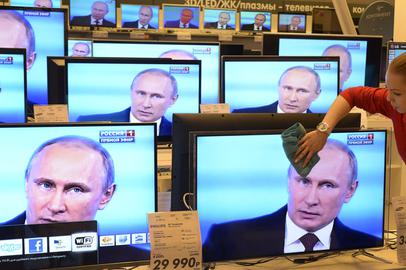Emil Filtenborg and Stefan Weichert are independent journalists based in Ukraine. In a new series for IranWire, they examine the landscape of disinformation in Russia and some of the false information that has emanated from the country since the outbreak of coronavirus.
Some of the most sustained and serious lies about coronavirus have their origins in Russia. But according to one expert, there is still no evidence of a coordinated global propaganda attack from the Kremlin - and Putin has quite enough to worry about at home.
As doctors and nurses battle Covid-19 in hospitals around the world, an information war is taking place between governments trying to take advantage of the situation. Western powers have accused Russia of spreading disinformation in an attempt to discredit their response to the virus, and to blame the United States and the European Union for releasing the virus.
The fact-checking site EUvsDisinfo, under the auspices of the European Union, has detected dozens of fake news stories about the pandemic coming out of Russia. Among them are articles claiming that American soldiers brought the virus to Wuhan in China and that the US, therefore, is responsible for the pandemic.
Other stories by Russian outlets have targeted readers and viewers in the Middle East. The Russian government-funded RT Arabic published a story claiming the US was trying to “cover up” the truth about Covid-19. Smaller news sites linked to Russia have also targeted the Arabic-speaking world, publishing stories about the EU's supposed unwillingness to help others around the world, claiming dictatorships are better equipped to contain the virus and even parroting a blatant lie that Bill Gates helped develop the virus.
All these and more been debunked by EUvsDisinfo as lies originating from the Kremlin, while Russia has denied all accusations.
Reports from the European Union’s diplomatic service and the US State Department have been leaked to the press and raise concerns about Russian disinformation. According to the reports, Russia, Iran and China have been targeting the West in a coordinated attack, on the basis that similar narratives are emerging from them.
Russian Disinformation is Nothing New
Ferocious information wars between the West and Russia have taken place for decades. During the Cold War, the Soviet Union (USSR) gained a reputation for its ability to obscure the truth and influence public opinion around the world.
The most striking example for many was when the USSR attempted to conceal the Chernobyl disaster from the public, only ceasing when international pressure made it impossible. Despite eventually acknowledging the incident, the USSR went on to report a low death toll and some claim the Russian government is still concealing the true figure today. Last year, when US TV channel HBO premiered the series Chernobyl, which accused Russia of hiding the truth, the Russian Ministry of Culture was quick to respond by funding a counter-series on the Russian channel NTV. This accused the CIA of sabotage, blaming the US for the biggest nuclear disaster in history.
Since 2014, Western governments have also accused Russia of orchestrating a propaganda campaign against Ukraine in the war-torn regions of eastern Donbass and Crimea. For this reason, many have assumed that Russian disinformation about Covid-19 is another deliberate government-sponsored campaign.
But Mark Galeotti, an Honorary Professor at University College London’s School of Slavonic and East European Studies, who has studied Russian history and security issues from the 1980s onwards, is not convinced. “Historically,” he says, “Russian disinformation campaigns have not been carefully run by the Kremlin. They often come from a wide range of content providers.
“For the Kremlin, it’s like a buffet. They can see what they like and build on it.”
Not a Co-ordinated Effort — Yet
Galeotti, a former advisor to the British Foreign Office who frequently travels to Moscow, says that while a lot of disinformation has its origins in Russia it is not all necessarily part of a state-sponsored propaganda effort.
“When you see a serious Russian campaign, it suddenly appears on different platforms at the same time,” Galeotti explains. “Suddenly the narrative in newspaper articles is repeated by the foreign ministry or retweeted by ambassadors. It moves from being one story to something coordinated and bigger, and we have not seen this from Russia with coronavirus.”
He points out that Russia could launch such a campaign at any time, but in his assessment the country is currently focused on domestic issues and on keeping good relations with the West. Russia, he says, is walking “a thin line” in its attempts to stay friendly with China while also avoiding being co-opted into the Chinese propaganda campaign. Instead, he believes Russia wants to use the crisis to rebrand itself on the international stage: which is why the country has also delivered aid to both the US and Italy.
A Domestic Issue First
Some narratives from China have been reproduced in Russian media. But Galeotti believes it would be a mistake to call this a coordinated propaganda campaign. Larger Russian media outlets, he says, have mostly ignored false information published by Chinese outlets because it wants to remain on good terms with the West.
The picture is different inside the country. In Russia itself, Galeotti says, the Kremlin is trying to control the flow of information because the Russian president is worried about his position. The Kremlin is also concerned with diffusing news about the scale of the challenges connected to the coronavirus in Russia. In one recent example that made international headlines, an independent doctors’ union leader, Anastasia Vasilyeva, was arrested by government forces after trying to deliver personal protective equipment to a hospital.
At the same time, there have been official attempts to debunk rumors about vodka and garlic being a cure to the novel coronavirus: rumors that had their origin in Russian news outlets and are affecting Russians.
“The virus is more of a domestic issue for Putin,” Galeotti surmises. “There is an attempt to clamp down on bad news inside Russia, such as stories about the lack of ventilators.”
Also in this series:
China's Campaign to Protect President Xi against Coronavirus Criticism
Chinese Embassies Work Overtime to Diffuse International Fury Over Coronavirus
Missing Data, Mud-Slinging and “Miracle Cures”: Why Disinformation Is Bad For Your Health
Iranian Online Network Still Peddling Coronavirus Disinformation
visit the accountability section
In this section of Iran Wire, you can contact the officials and launch your campaign for various problems



























comments